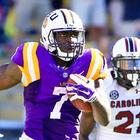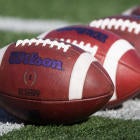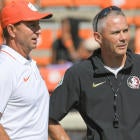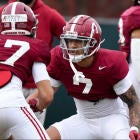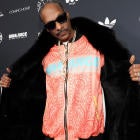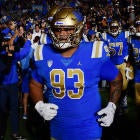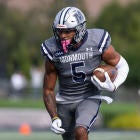The mother of LSU star running back Leonard Fournette recently tried to register the family's last name as a trademark. She was denied. It's one of two marks his mom has sought since the family tried creating an online business to capitalize off Fournette's fame before his NCAA career began.
Welcome to the year of the returning college football star, where brand names are firmly established. Deshaun Watson, Christian McCaffrey, Dalvin Cook, J.T. Barrett, Baker Mayfield, Royce Freeman, Josh Rosen, Myles Garrett and Nick Chubb are among the household names who are back. No name, though, may be bigger than Fournette.
Sports economists estimate Fournette would be worth more than $1 million if NCAA rules allowed him to get paid. But until he turns pro, Fournette is arguably the most marketable college player in 2016 who is prohibited from directly capitalizing off his value. That will change soon, and the Fournette family appears to be preparing for the day he can cash in.
Lory Fournette, Leonard's mom, filed an application on May 20 for the trademark "Fournette," according to records filed with the U.S. Patent and Trademark Office. The request said the mark would be for various clothing and apparel, including bandannas, belts, blazers, boxer shorts, hats, coats, ear muffs, shoes, shorts, pants, socks, sport coats, sweat pants, sweat shirts, sweaters, gloves, jackets, jerseys, T-shirts, ties, vests, wristbands, ponchos, pajamas, robes and thermal underwear.
The trademark office denied her application on Aug. 2 because "Fournette" is a surname associated with her famous son.
"In this case, while the surname FOURNETTE is pretty rare, applicant is Lory Fournette, and her son, Leonard is a famous college football player from LSU," the trademark office wrote. "People would likely see this mark and make an association with the surname of this athlete. ... The mark also is a variation on the last name "FOURNET," which the attached www.ancestry.com information shows comes from the French term for 'baker' and has the 'look and feel' of a last name. Therefore, any other minor significance attached to this mark is secondary to its primary meaning as a surname, and it must be refused."
Lory Fournette is also making her second effort to acquire a trademark for "BUGA Nation," an acronym meaning "Being United Generates Attitude" that Fournette's parents created when he was the nation's No. 1 recruit. Fournette's mom was initially granted a notice of allowance in June 2014 but abandoned the efforts because she failed to file for a statement of use or an extension of time.
In November 2015, Lory Fournette refiled her application for "BUGA Nation" for various clothing and apparel products. A notice of allowance was approved May 31. She has until the end of November to either show the mark is being used for commerce or request a deadline extension. BUGA Nation hats, visors and shirts are listed for sale at this website that does not mention Fournette, whose likeness, if used, would violate NCAA rules.
When reached by phone by CBS Sports, Lory Fournette said she would call back later. She did not return a subsequent message.
Last November, USA Today reported that the Fournette family received about $10,000 to build a website and produce "BUGA Nation" merchandise to be sold. Three owners of companies involved told USA Today they gave Fournette and the family's manager more than $20,000 in discounts because they expected strong sales.
The website launched in 2014, but sales were quickly stopped due to NCAA rules, Lory Fournette told USA Today. "There's certain rules that just can't be broken," she said at the time.
After the report, LSU began investigating whether NCAA rules were violated. "LSU worked collaboratively with the Southeastern Conference and NCAA in reviewing the matter," LSU said in a statement this week. "Based on interviews conducted and facts gathered during the university's review, the NCAA determined that there had not been a violation of NCAA Bylaws."
The NCAA does not permit athletes or their family from profiting off a college players' name, image or likeness. It's an issue that continues to be fought in the seven-year-old Ed O'Bannon lawsuit, which the U.S. Supreme Court will review in late September to determine whether it will hear the case.
Southern Utah University economics professor David Berri said LSU would be paying Fournette nearly $1.4 million if college football allocated money to players the way the NFL does. Berri based his estimate off the NFL's model, which distributes 48 percent of its revenue to players. Because of the salary cap, the 32 NFL teams actually allocate 37 percent of NFL revenue to player salaries.
To determine a number for Fournette, Berri applied the NFL approach to the top 32 college football teams' revenue, which totaled $2.1 billion in 2015. If those teams allocated 37 percent to their players, the per-team salary cap would be $24.7 million.
The top five NFL running backs have an average salary cap of $8.6 million (almost 6 percent of the NFL team cap). If it's assumed Fournette is a top-five college football running back and schools allocated money like the NFL, Berri concluded LSU would pay Fournette $1,376,850. When factoring LSU's costs for Fournette's scholarship, he is getting underpaid by about $1.3 million, Berri said.
If Fournette got paid, "LSU would still be making a substantial profit [as the NFL does]," Berri wrote via email. "Just not quite as much as they are now."
Andrew Zimbalist, a Smith College sports economist, estimated that Fournette would be worth between $2 million to $4 million if NCAA rules allowed players to be get paid. Zimbalist based the figures on rough estimates of LSU's athletic department revenue and the salaries of elite NFL players.
"My estimate is conservative," Zimbalist said. "What's happening here is instead of spending money on the players in order to recruit them, because you're not allowed to, you spend money on the facilities to make them want to come and you spend money on the coaches."
Fournette enters his junior season with arguably the most valuable brand of any current NCAA athlete. Not only does he appeal to fans due to his unique running style of speed and power, he could have marketability off the field, too, due to his position on social issues and charitable work.
This summer, Fournette wore a shirt honoring Alton Sterling, a black man whose shooting death by police led to racial protests in Baton Rouge. "I have a voice," Fournette said. "Why not use that platform?"
Last fall, the NCAA allowed Fournette to sell an autographed jersey with proceeds going to help South Carolina flood victims, this after Fournette first said he thought he was not permitted to do so. The NCAA essentially determined that it was OK for a player to profit off his likeness as long as the money went to someone else for charity. The jersey sold for $101,000, the highest price paid for by a game-used college football jersey in an internet auction, according to ESPN. It easily surpassed the $31,070 spent on 1942 Heisman Trophy winner Frank Sinkwich's Georgia jersey.
At LSU's online store this summer, the school is selling Nike jerseys with Fournette's No. 7 -- without a last name, of course -- for $134.99 (white limited), $109.99 (gray limited), $89.99 (white or purple replica), $49.99 (preschool) and $44.99 (toddler). Other famous players have worn No. 7 for LSU. But the aforementioned jerseys differ from another for sale with a No. 7 and the name of former LSU star Tyrann Mathieu, whose NCAA career is over.
On eBay, fans and companies are trying to sell all sorts of Fournette products. Jerseys, T-shirts, framed art work, photographs, autographs and other items have his name or picture on them. A search for Fournette's name on eBay turned up 377 results.
Fournette has huge followers on social media, where he identifies himself by his last name and jersey number. He enters 2016 with the most combined Twitter and Instagram followers (564,000) among college football players, according to research by CBS Sports. Only three college football head coaches who are on social media possess more combined followers than Fournette: Ohio State's Urban Meyer (790,000), Michigan's Jim Harbaugh (773,000) and Tennessee's Butch Jones (771,000).
It's not just Fournette who is helping to build his brand on social media. Some other top players are accumulating significant combined Twitter and Instagram followers.
| Player | Social media followers* |
| Leonard Fournette, LSU RB | 564,000 |
| Deshaun Watson, Clemson QB | 435,000 |
| J.T. Barrett, Ohio State QB | 403,000 |
| Christian McCaffrey, Stanford RB | 194,000 |
| Jalen Hurd, Tennessee RB | 187,000 |
| Josh Dobbs, Tennessee QB | 165,000 |
| Baker Mayfield, Oklahoma QB | 134,000 |
| Jacob Eason, Georgia QB | 113,000 |
| Kyler Murray, Oklahoma QB | 110,000 |
| Nick Chubb, Georgia RB | 99,000 |
| Dalvin Cook, Florida State RB | 95,000 |
| Royce Freeman, Oregon RB | 88,000 |
| * Twitter and Instagram accounts combined. | |
UCLA quarterback Josh Rosen, in a recent Bleacher Report feature, spoke out against NCAA rules preventing players from making money. Rosen called it ironic college football players collide into each other head-on in exchange for an education when "that's what you're supposed to be using your head for, an education."
"I'm very fortunate, I don't need [money] now," Rosen told Bleacher Report. "But there are many others selling out every play for what? I know some people don't like to have the debate, but it's not going away, and schools keep making more money. At what point do we finally address it?"
Last November, a California-based company called The Creative Space Group applied for the trademark "Chosen Rosen," a nickname of Rosen. The application said the mark was for clothing, especially T-shirts, hats and sweatshirts, and educational and entertainment services. Among the uses would be "personal appearances by a sports celebrity."
A letter of protest was filed in March by an unidentified person or entity, and the application was denied because the trademark office said it may falsely suggest a connection with Rosen. The trademark office wrote there is no evidence in the record showing Rosen is connected with the goods and services the applicant sought to sell under "Chosen Rosen." A message left for the owner of The Creative Space Group was not returned.
In recent years, several coaches and their universities have acquired trademarks for coaches' names or phrases associated with them. They include Clemson's Dabo Swinney ("Dabo Swinney," "Dabo" and "Dabo's All-in Team"), Ohio State's Meyer ("Urban Meyer" and "Urban Meyer Knows") and Auburn's Gus Malzahn ("Gus Bus" and "Hurry Up No Huddle").
Although Harbaugh pushes the envelope at Michigan, he appears to have no trademarks directly owned by him. If Harbaugh or Michigan ever want the trademark to his family's famous saying -- "Who's got it better than us? Nobody!" -- it's not available. The San Francisco 49ers have controlled the mark since 2012, when Harbaugh was their coach.
As for Fournette, he took out two $10 million insurance policies for this season, according to Dennis Dodd. The policies purchased by his parents cover him for $10 million in total disability in case of a career-ending injury and $10 million for circumstances that would lead him to fall from his projected NFL Draft spot. Only a handful of college athletes have ever collected on career-ending insurance.
This week, Fournette met with the media while wearing bright yellow sneakers that are reportedly sold for $585. Inevitably, the shoes caused the usual reaction by some fans: How did he pay for them?
Fournette has four months left before those questions are over. In the year of the returning college football star, that's four more months as a marketable player who's not allowed to receive his market value.












